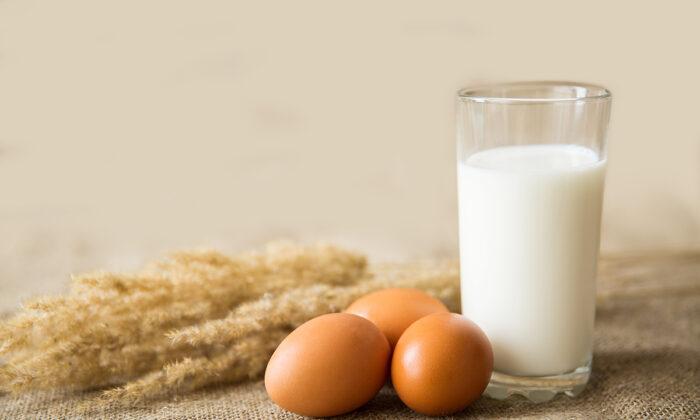There are many edible fungi. In addition to common mushrooms such as shiitake mushrooms and king oyster mushrooms, single-celled yeasts used for bread or winemaking, as well as Poria and Antrodia camphorata, which can be found in traditional Chinese medicine and health care products, are all edible fungi.
These edible and medicinal mushrooms have been found to enhance and regulate immunity, which is beneficial during the ongoing COVID-19 pandemic.
These Macrofungi Contain Polysaccharides That Can Boost Immunity
Common foods such as shiitake mushrooms, Agaricus bisporus, oyster mushrooms, king oyster mushrooms, black and white fungi, and maitake mushrooms are all large fungi with apparent fruiting bodies that can be distinguished with the naked eye.Chinese medicinal materials such as caterpillar fungus, Poria, Antrodia camphorata, and Ganoderma lucidum, which are often used to nourish and strengthen the body, are also large fungi. Ganoderma lucidum (reishi mushroom) has a medicinal history of 5,000 years in China, and it is also believed to be an “elixir” in mythology.
In the eyes of traditional Chinese medicine practitioners, these edible and medicinal mushrooms provide many health benefits.
Mushrooms such as shiitake mushrooms and king oyster mushrooms can enter the meridians of the spleen, stomach, liver, and kidney. According to the theory of traditional Chinese medicine, the human body has multiple meridians, and food entering the meridians is beneficial to the viscera corresponding to the meridians.
Dr. Wan Jung Wu, director of Rui Ming Chinese Medical Clinic in Taiwan, pointed out that innate immunity is related to the liver and kidney, while the spleen and stomach are the foundation of the acquired constitution. Taking good care of these internal organs can keep the immune system in excellent condition. Traditional Chinese medicine also believes that mushrooms have a calming effect on the nerves.
Modern research has found that the cell walls of edible and medicinal mushrooms contain polysaccharides, which exhibit immunomodulating, anti-tumor, antioxidative, anti-inflammatory, antibacterial, and antidiabetic activities.
A review of the anti-tumor properties of mushrooms indicates that mushrooms are good at immune modulation and can affect hematopoietic stem cells, lymphocytes, macrophages, T cells, dendritic cells (DCs), and natural killer (NK) cells.
Gyaltsen Lobsang, director of the Dr. Lobsang Preventive Medicare Clinic in Taiwan, added that in addition to regulating the immune system, polysaccharides are also beneficial to the autonomic nervous system; and the two have an impact on each other. The human immune system will be better when the autonomic nerves and emotions are more stable.
Mushrooms are also rich in water-soluble fiber, which can serve as food for intestinal probiotics; and cultivating good intestinal bacteria is beneficial to the immune system. Dried shiitake mushrooms that have been exposed to the sun contain vitamin D, which also helps to boost immunity. In addition, mushrooms are rich in protein—their protein content is between that of meat and fruits/vegetables, but they are not as high in fat and cholesterol as meat.
White fungus, one of the edible fungi, also has the effect of moistening and clearing the lungs. Ya-Wen Yu, director of Royal Jade Traditional Chinese Medicine Clinic in Taiwan, said that the mucous membranes will be drier in autumn and winter when the weather is dry. The lung-nourishing effect of white fungus can make the mucous membranes stronger and help resist invading viruses from the outside.
Medicinal fungi commonly found in pharmacies and health products, such as Poria, caterpillar fungus, Ganoderma lucidum, and Antrodia cintrodia, also provide unique health benefits.
Poria: a common Chinese herbal medicine. The Chinese Four Herbs Soup that the Taiwanese often eat contains Poria. It has the benefits of invigorating the spleen and stomach, removing dampness, and calming the nerves. It is suitable for people who have poor sleep quality or are prone to heart palpitations.
Ganoderma lucidum: can regulate and boost immunity; it is also good for the heart, lungs, liver, and kidneys. Dr. Wu said that people with poor sleep quality or a busy work schedule, and those who are prone to restlessness or neurasthenia can consume Ganoderma lucidum to ease their symptoms.
Caterpillar fungus: a parasitic fungus that grows on insects. It has the benefits of repairing mucous membranes, nourishing the lungs, relieving asthma, stopping bleeding, and reducing phlegm. For patients with a chronic cough to the point of wheezing, consuming caterpillar fungus can protect their respiratory system.
Antrodia cintrodia: known for its hepatoprotective effect and can activate the liver’s detoxification system. Some people consume Antrodia cintrodia to cure hangovers. People who often stay up late and are tired from work can also consume Antrodia camphorata to protect their liver.
Avoid Mushrooms if You Have Any of These 4 Health Conditions
1.) Autoimmune diseasesPatients with autoimmune diseases such as systemic lupus erythematosus, psoriasis, sicca syndrome, and rheumatoid arthritis already have an overactive immune system, so it is recommended for them not to eat mushrooms to avoid aggravating their symptoms.
2.) Skin diseases and allergies
Similar to the reason why patients with autoimmune diseases should not eat mushrooms, traditional Chinese medicine considers mushrooms a type of “stimulating food.” People who are prone to allergies or skin problems, such as eczema and urticaria, should avoid eating them.
People who are suffering from skin diseases and allergies are advised to temporarily stop eating mushrooms.
3.) High dampness in the body
Dr. Wu pointed out that the nature of mushrooms is relatively damp due to their growing environment, so people with high dampness in their bodies should pay attention to the amount of mushroom consumption.
Under normal circumstances, the water in the body should be maintained in a balanced state. When the body’s ability to remove water is poor, it accumulates more moisture. Such people have one clear characteristic: their stool will leave marks on the toilet bowl.
4.) Cancer
Medicinal fungi that regulate immunity, such as caterpillar fungus and Ganoderma lucidum, can enhance the effects of chemotherapy, but they should be used with caution in cancer patients. Yu said that an overactive immune system would actually promote the growth of cancer cells, so it is best for cancer patients to consult a traditional Chinese medicine practitioner if they want to take medicinal fungal supplements.
In addition, pregnant women, breastfeeding mothers, and children under 3 years old whose immune system has not fully developed are not recommended to consume medicinal fungi.
2 Herbal Recipes to Improve Long COVID Symptoms
Delicious mushrooms can be prepared in countless ways and combinations. First of all, you do not need to have a preference for a certain type of mushroom, nor do you need to eat a large number of mushrooms every day in order to gain the immune-boosting benefit from mushrooms. In addition, try not to use high-temperature roasting and frying cooking methods, so as not to lose the nutritional value of mushrooms.Mushrooms can be cooked with various ingredients. For instance, chicken soup with mushrooms is one of the home-cooked dishes that can boost immunity. Yu pointed out that traditional Chinese medicine believes that chicken soup can improve the nutrient absorption of the spleen and stomach, and good nutrient absorption will naturally enhance immunity. She recommends adding goji berries and jujubes when cooking chicken soup with mushrooms.
It is worth noting that mushrooms are slightly “colder” in nature and flavor. They can be neutralized by adding some warmer ginger when cooking.
Additionally, many people were infected with COVID-19 during the pandemic and are experiencing long COVID. These symptoms can also be improved by consuming mushrooms. Here are two herbal recipes:
Qi and Blood Nourishing Soup
Medicinal materials: 10 g of angelica sinensis, 10 g of ligusticum wallichii, 10 g of radix paeoniae alba, 10 g of cooked rehmannia, 10 g of ginseng, 10 g of Atractylodes Rhizome, 15 gr of Poria, and 10 g of Radix Glycyrrhizae preparate.Water and ingredients: 1000 ml of water, a moderate amount of king oyster mushrooms (can be substituted with other edible mushrooms), or ribs (vegetarians can leave this out).
Steps:
- Wash all the medicinal materials and drain them for later use.
- Wash and blanch the pork ribs for later use. Rinse the mushrooms quickly and chop them into pieces.
- Put all the above ingredients into a pot, pour in water, and boil it over high heat.
- After the water starts boiling, turn to low heat and simmer until the ingredients are soft. After seasoning, the soup is ready to serve.
Chinese 4 Herbs Soup
Medicinal materials: 20 g of Poria, 20 g of Chinese yam, 20 g of gordon euryale seeds, 30 g of lotus seeds, and 30 g of barley.Water and ingredients: 1000 ml of water, a moderate amount of king oyster mushrooms and shiitake mushrooms (can be substituted with other edible mushrooms), or ribs (vegetarians can leave this out).
Steps: Same as in the preparation of the Qi and Blood Nourishing Soup, except that the barley needs to be soaked in water for two to three hours after washing.
If COVID patients still experience symptoms such as an itchy and inflamed throat, or produce a lot of yellow phlegm, and are feeling tired, they can consume the Chinese four herbs soup. It is good for spleen and stomach health and can help maintain good immunity. It is a soup that is suitable for the whole family and can be drunk when you have the flu.
Furthermore, many patients with COVID have heavy dampness, and both Chinese four herbs soup and barley can help remove moisture from the body.




